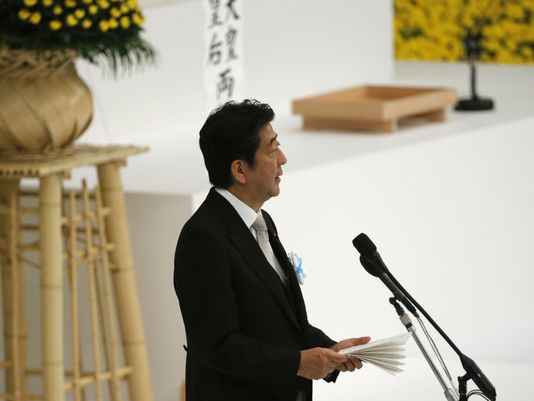Tokyo-Tokyo and Seoul exchanged criticism on the 71th anniversary of the World War II’s end. South Korea objected as Japan leaders paid tribute to Yasukuni shrine, while the Japanese government expressed regret as Korean MPs visited a disputed island.
Japanese Prime Minister Shinzo Abe stayed away from a Tokyo shrine that honors convicted war criminals among the nation’s war dead. Abe instead sent a gift of money and religious ornaments to Yasukuni Shrine. The PM’s special aide Yasutoshi Nishimura, a ruling Liberal Democratic Party lawmaker, said that he offered a donation from Abe to the shrine along with the religious ornaments and prayed on his behalf. However, the Korean Ministry of Foreign Affairs insisted on issuing a statement in which it expressed regret as Japanese officials visited a shrine which honors millions of war dead, according to the ministry.
China’s Xinhua news agency urged Japan to repent its wartime past or risk steering the country down a dangerous path. Emperor Akihito, at a ceremony honoring victims of the war, expressed deep remorse over the conflict.
Recently, the Japanese Emperor hinted that he aims at abdicating in a few years. During the same ceremony, which was held at Budokan Hall in Tokyo, Abe, who used a less apologetic tone, said that Japan would make all possible efforts to participate in building world peace and on putting an end to wars.
New Japanese Defense Minister Tomomi Inada was visiting troops in Djibouti and unable able to go to the shrine. Some considered that Inada’s visit to Djibouti is a suitable excuse to avoid a diplomatic crisis between Japan and its neighbors in light of the ongoing efforts to hold a bilateral summit between the Japanese Prime Minister and the Chinese President during the G-20 summit that will take place in China next month.
On another hand, a group of South Korean lawmakers celebrated the day by visiting small disputed islands, which provoked the protest of the Japanese government.
China also witnessed celebration activities and Chinese media showed documentaries condemning the Japanese occupation of China. Many Chinese and Korean officials gathered in Nanjing to participate in a memorial ceremony to commemorate the victims of massacres committed by Japanese forces in 1937.
